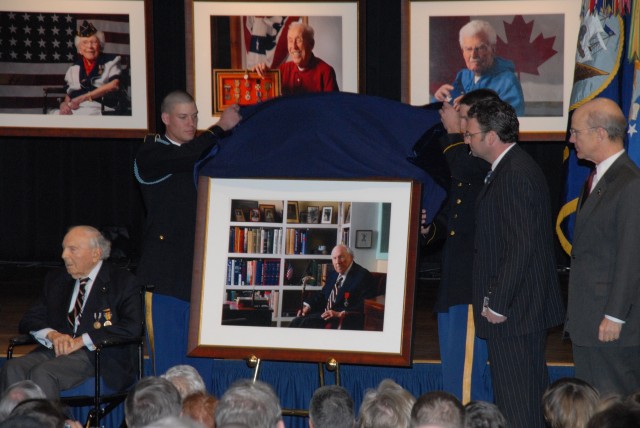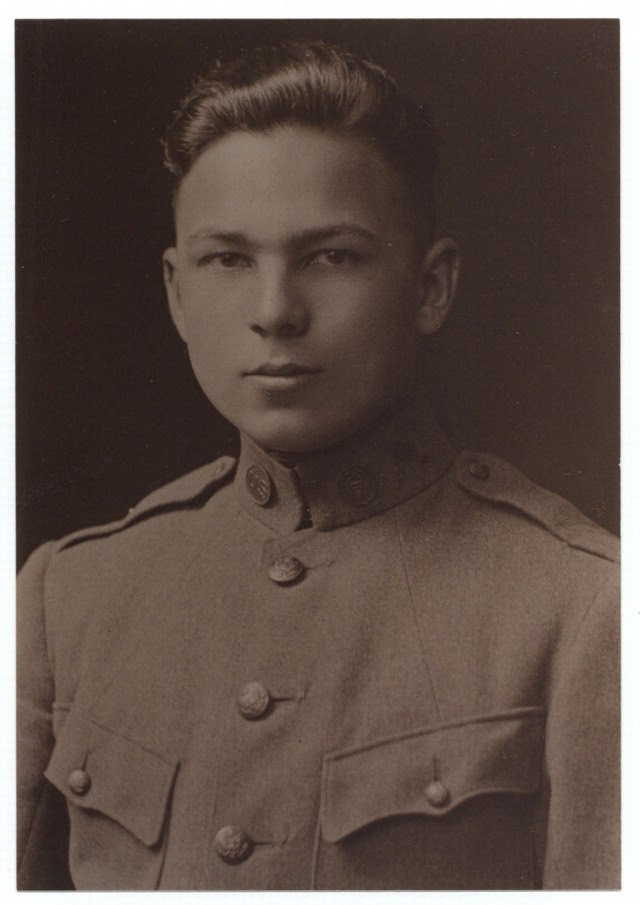WASHINGTON (Army News Service, March 7, 2008) - The last American known to have served in France during World War I was on hand to help Secretary of Defense Robert Gates and Secretary of the Army Pete Geren unveil a new portrait exhibit at the Pentagon Thursday.
The life of former Cpl. Frank Woodruff Buckles, now 107, mirrors the 20th century and he remains the only representative of 4.7 million troops who marched off to fight the Kaiser 90 years ago - a generation of veterans now in danger of being forgotten.
Secretary Gates praised Buckles' service and noted that while World War I lacks a national memorial and has failed to capture the American consciousness the way later conflicts have, it set much of the modern world stage.
"The 20th century truly began with an archduke's assassination in Sarajevo on June 28, 1914," he said. "The war, which started as a fight over Balkan independence, left in its wake a redrawn map of Europe and the Middle East - including the demarcation of a land in Mesopotamia called Iraq. From Baghdad to Belgrade, the places that mattered then are in the forefront of our consciousness today."
Helping America Remember
In 2006, photographer David DeJonge set out to help America remember a war that was neither great nor ended all wars, by documenting remaining World War I veterans. By the time he could finance the project, four had died. Five more died within weeks of their sessions, and today only Buckles and Canadian-native John F. Babcock are alive. The collection of nine portraits will remain on permanent display at the Pentagon.
"For those of us here today, we will forever put the face of Corporal Buckles on the Great War and the nine wrinkled and aged faces so masterfully captured by the artistry of our photographer, David DeJonge. And when we put a human face on a heretofore faceless war, we are reminded and convicted of the personal debt that each of us owes to those who have secured the blessings of our liberty," said Secretary Geren.
Unexpected Honor
Wearing the Legion of Honor he was awarded by French President Jacques Chirac, Buckles simply thanked the room on behalf of his fellow World War I veterans and received a standing ovation from the standing-room-only crowd.
He never expected to be alone, Buckles had said Tuesday during an interview at his farm in West Virginia, but since he is, he will serve his generation as best he can.
Only 16 when the United States declared war on Germany in 1917, Buckles had to lie about his age several times to enlist -- although he insists "lie" is too strong a word -- and was rejected by the Marines because he was too small and by the Navy because he had flat feet.
An Army recruiter in Oklahoma finally took him after Buckles said the only record of his birth was in the family Bible in Missouri. He joined the First Fort Riley Casual Detachment, serial number 15577, and sailed for Europe on the HMS Carpathia, the ship that had rescued the survivors of the Titanic in 1912.
Anxious to Reach Frontlines
He went to all that effort to serve, he said, "Because it's an important thing. The whole world was interested in this. Why shouldn't I be'"
An old sergeant had told Buckles that the fastest way to get to the action in France was to join the ambulance corps, as ambulance drivers were desperately needed at the front, but to Buckles' dismay, his unit was rerouted and he found himself in Winchester, England, driving officers on a motorcycle with a side car.
After pestering everyone he could think of and several unsuccessful schemes to simply fall in line and board a troop ship across the channel, Buckles eventually made it to France, but never near the trenches. As an ambulance driver, he saw plenty of casualties, but never any combat.
Unforgetable 'Black Jack'
After the war, he helped escort hundreds of German prisoners of war home before returning to Oklahoma and meeting Gen. John "Black Jack" Pershing, commander of U.S. forces during World War I, which Buckles still recalls as one of the highlights of his life.
"After I'd given the general a snappy salute and passed on, he said to the sergeant to come back, he had some questions to ask me. He knew about the four gold bars on my sleeve, which indicated I'd been in Europe two years. He noticed the cut of my jacket was better material than that issued by the Army. He also would have noticed my Missouri accent and asked me where was I born. I said, 'On my father's farm...in Harrison County, Mo.' He said, 'I was born...in Linn County, just 43 miles, as the crow flies, from Harrison County where you were born.'"
Wrong Place, Wrong Time
Buckles' next career in shipping brought him in contact with two of the Axis powers of the Second World War. He traveled frequently to the Germany of the Third Reich -- he remembers a German officer telling him they were preparing for another war as early as the late-1920s -- and in a terrible example of being in the wrong place at the wrong time, was in Manila when Japan invaded the Philippines in 1941.
He had turned down a job in Buenos Aires and expected to be in the Philippines for only six months. Instead, during three years of incarceration, he nearly starved as he ate each small, mush-like meal from a tin cup the size of a coffee mug.
Buckles still has that mug and said he lost more than 50 pounds in the prison camp. He said toward the end, the Japanese intentionally starved the prisoners and as the Americans got close, they planned to murder them. Paratroopers arrived just in time, and Buckles recalled being so happy to see them that he dressed up in the starched shirt and pressed pants he had saved for 38 months.
SecArmy: Vets Shape Future
"This nation called and a country boy from Missouri went," said Secretary Geren. "Today young men and women from our generation, the best of this generation too, are joined in a war in a far-off land that will shape their future and the world's future for decades to come. As with Frank Buckles' war, some day this war will end and all will come home with their lives and the world forever changed and the vivid and searing memories of their war will live with them throughout their days on this earth.
"But for those who did not serve, today's war soon will recede from the front pages and into the mists of history, as has the Great War, Corporal Buckles' war. For most Americans it will become little more than a chapter in a high-school history text book and we quickly will forget the blood debt owed by the many to the few."




Social Sharing